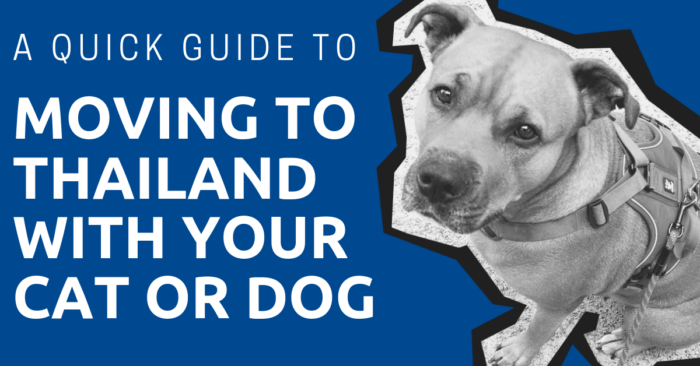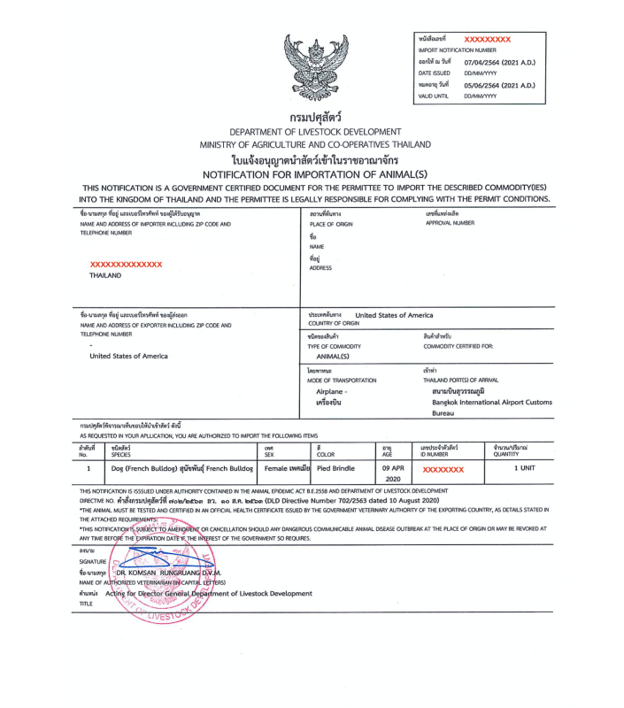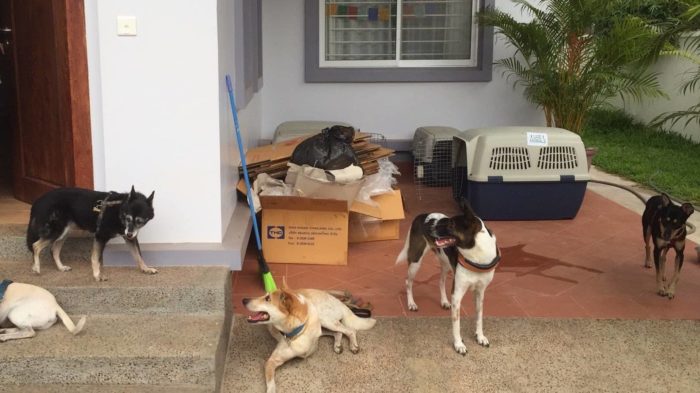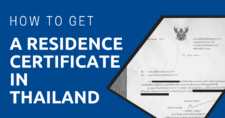
So you have decided to leave your home and move to Thailand with your loved ones. For us pet lovers, of course, I am talking about our four-legged companions.
The question is not if you can bring your beloved pets to Thailand, but rather how.
By following proper guidelines and understanding the basic rules, you shouldn’t have a problem bringing your pets to the country.
Don’t also forget to check out our premium subscription where you get an access to our hundreds pieces of exclusive contents to help you set-up your life in Thailand hassle-free, including our tips on how to find accommodations that allow pets.
"*" indicates required fields
Disclaimer: This article may include links to products or services offered by ExpatDen’s partners, which give us commissions when you click on them. Although this may influence how they appear in the text, we only recommend solutions that we would use in your situation. Read more in our Advertising Disclosure.
Contents
Requirements for Shipping Your Pet to Thailand
Although Thailand is quite a bureaucratic country, the procedure for bringing pets here is straightforward.
However, before getting started, you should familiarize yourself with the proper procedures to ensure that you meet all the requirements.
This article only includes information related to pet shipping. We have a separate article on shipping to Thailand covering everything you need to know when you want to ship your belongings here.
Paperwork
There are many paperwork involved when bring pets to Thailand. Let’s take a look at each one.
Health Certificate
There are many logistics involved. However, the first step is to get a health certificate from your veterinarian in your home country. It’s important to note that the official document must be written in English and endorsed by an accredited authorized veterinarian.
Be aware that the health certificate will only be valid for 10 days from the date it was endorsed.
Work with your veterinarian to ensure you meet the timeframe and that all necessary information is included in the official document.
- Number and species
- Breed, sex, age, and color or animal identification
- Name and address of the owner OR the kennel of origin
Furthermore, the country of origin must be free from rabies outbreaks for the past twelve months.
You may need to provide a certificate stating that your pet is coming from a region where infectious disease is not prevalent and is under control.
Simply put, if your pet is certified as healthy and shows no signs of infection or contagious disease such as ectoparasitism, you shouldn’t have a problem getting a health certificate.
Vaccinations
It’s vital to know that you must complete all required vaccinations no less than 21 days before departure.
If you’re coming from a Western country, vaccinations for babies, distemper, hepatitis, and parvovirus are standard practice.
However, be aware that Thailand requires dogs to be vaccinated for leptospirosis, which is not a required vaccine in most other countries.
Another option is providing a negative test result for leptospirosis within 30 days before departure.
An experienced veterinarian will most likely have experience and knowledge of the proper protocols necessary.
Work closely with your veterinarian to ensure you meet all requirements.
Remember, official documents and certificates must be written in English. It’s good advice to make five copies of every page of your pet’s passport too.
Import Permits
After completing the health certificate, you can now apply for the import permit.
Thailand has recently updated to a new electronic system. This is a fairly straightforward process. There is only one form required and can be downloaded from the Department of Livestock Development.
Make sure to include all required information and necessary documents as stated in the guidelines.
- completed R1-1 form (requires your full name, address in Thailand, and passport information
- copy of the pet owner’s Passport
- address in your country and your address in Thailand
- animal details: breed, sex, age, color
- proof of vaccinations and proof of microchip
- photo of your pet
- arrival details (Time and date of arrival, flight number, airport)
After that, send all of the information and document to the Department of Livestock Development via this email: [email protected]
It’s vital to know that you must apply for the pet import permit seven to 14 days before your departure. And it can take one to two business days for approval.
Once the permit is issued, it will only be valid for 60 days.
Simply follow the guidelines on your end.
Here is the official link for Thailand pet import guidelines to help ensure you meet all the requirements.
Here is an example of what the import permit looks like.

Department of Livestock Development Contact
Just in case, write down the Department of Livestock Development address:
- Department of Livestock Development, Ministry of Agriculture and Cooperatives
- 69/1 Phayathai road, Ratchathewi district, Bangkok 10400, Thailand
- Tel: +66-2-6534425 ext 1352
- E-mail : [email protected]
They do have a website in English that provides useful information.
Pet Crate
Once all the logistics and paperwork are done, it’s now time to go shopping for a crate.
When it comes to crates, don’t buy a cheap one. Look for IATA-approved crates, as the quality is well worth the money.
Once you buy a crate that meets all your expectations, you should also place a “Live Animal” sticker on top.
To prevent dehydration, airlines will require you to install a water bottle dispenser.
In regards to food, to prevent upset stomachs and minimize bowel movements during transit, you may decide not to provide food.
If your animal suffers from mental health issues such as anxiety, consult with your veterinarian regarding any recommended medications.
Dealing with Airlines
It’s advised to establish good communication with the airline before booking your flight to ensure there are no hiccups during your travel.
For example, some airlines operate codeshare flights. These flights will require you to transfer to a different airline during a layover.
This can present a problem as all airlines have different policies regarding pet travel.
One of our readers learned this the hard way. He found out during a layover that the connecting airline did not allow pets to board international flights.
To prevent any mishaps and miscommunication, you should ask the airline to confirm in writing that your pet will make it to its destination before booking your flight.
How to Send Your Pet to Thailand
When flying your pets abroad, you have two options. Either they can travel with you on the same flight, or they can be shipped separately as cargo.
If you live in a neighboring country, you might consider overland options as an alternative
Flying with Your Pets
When moving abroad, a viable option is to have your belongings shipped in a separate cargo container.
However, it’s understandable for us pet lovers to have our reservations about shipping our beloved pets unaccompanied.
Nearly all airlines allow pets to travel in the cargo of your flight. However, depending on the airline, your pet may be able to fly in the cabin with you.
Keep in mind that some airlines may restrict certain dogs, such as short-nose breeds that commonly have breathing problems and are prone to health abnormalities.
Before booking your flight, it’s best to communicate upfront with your airline to ensure your pet doesn’t fall under any restrictions.
Most people move to Thailand by air while their belongings are shipped in a container. Usually major airlines allow you to have pets either as excess baggage or – if they are small enough – as cabin luggage. In some cases, pets are also treated as cargo. Some airlines may refuse certain breeds, in particular those with breathing difficulties because of abnormalities. Better ask the airline in advance.
Excess Baggage versus Cargo
The easiest and least stressful way is to take the pets as excess baggage. It’s also cheaper, because you just pay a bit more for the overweight.
But it is only possible if you are on the same flight with the pets. Then you just go to the check-in with your pets, show them the confirmation and off they go together with your suitcases.
If, for some reason, you want your dog or cat coming to Thailand once you have settled in, had the cat door installed and found a dog swimming pool, then consider bringing them in as cargo. This has to be done by a professional cargo specialist.
They need the same documents, and you should be aware that the vet’s certificates are only valid for a certain time period. The company will then pick up the pets and bring them to the cargo terminal. They or their local partners in Thailand will then inform you once your dogs or cats arrive, and you can pick them up at the cargo terminal (or get them delivered to your house depending on your arrangements).
Cargo
Another option is to send your pet separately as cargo.
This can be a great option if you’re still working out your living arrangements and would like to settle your accommodations and other logistics before moving your pets abroad.
This can be arranged by a professional cargo specialist. Be aware that when shipping by cargo, protocols and required documents will be the same. However, shipping your pet separately as cargo requires a different type of import and/or export permit.
Work closely with the shipping company, as the required documents and pet’s health certificate are only valid for a certain time.
The shipping company, or its local partners in Thailand, will inform you when your pet arrives. Depending on your arrangement, you can pick it up at the cargo terminal, or have it delivered to a specific address.
What to Do at Suvarnabhumi Airport
You just landed in Thailand, but where’s your dog? Since most people will bring their pet into the country by flying in via Suvarnabhumi Airport, I’ve put together a quick guideline how to navigate the place and procedures once you arrive here.
Suvarnabhumi Airport in Bangkok is the main airport for Bangkok. This means they do have a lot of experience with pets coming in together with their owners. So after you disembark from the plane, you go through immigration, get your luggage at the carousel, and then go to the Oversized Baggage Area.
If you’re lucky, you’ll see Fiffy already in his box, or you’ll hear some meow from Pussy whose box was nicely placed next to the baggage belt by airport staff. Important: DO NOT TAKE THEM OUT OF THE BOXES UNTIL YOU CHECKED WITH ANIMAL CUSTOMS between baggage claims 9 and 10.
Next you’ll want to go to the quarantine inspection area. The inspection area is on the immigration side of the hall. Now comes the part where you start learning how things in Thailand work. By law, there is a 30-day quarantine for imported animals, but like many laws, it is not enforced. So, what you do is show the officers all the papers, smile a lot (yes, it was a long flight, but do you want to get your pets out or not?), be as polite as you were when you first met your mother-in-law, and DO NOT GET ANGRY, whatever happens.
If everything goes well, the officers will stamp your papers and may ask a question or two. Some may not speak Oxford English, so if you do not understand what they said, POLITELY ask them to repeat the question. The import license is 500 baht and another form is 10 baht. Be aware that things take time in Thailand for no real reason. You have to wait 10 minutes or even more than 60 minutes.
Once you get your stamped documents, you walk to the exit, show the customs officer the still-wet-from-the-stamp documents, smile, and after paying the 1000 baht import duty, he will clear you and your pet.
That’s all. You made it. Take a deep breath and get the dogs out for a pee, but please on a leash and somewhere discrete. If you haven’t organized transport in advance, which I strongly recommend, you can look for a taxi van. Not all taxi drivers like to transport pets, so it could be a bit of a hassle. Better book a transport from a local pet relocation company before leaving home.
Moving Your Pet Across a Land Border
In case you live in one of Thailand’s neighboring countries, you can consider moving by land. The official requirements are the same, but the procedure at the border checkpoint is a bit different. Actually, it can be very different, because it is basically up to the local customs and immigration officers.
Some may not even look at the dogs, others with a nose as good as a dog smell financial opportunity. Be safe with all the vaccination records and a health certificate from a registered vet, and then improvise. Be sure there is a solution, if there is a problem coming up, it just takes time and patience to find it. Sometimes you can also find a fixer, a local, who can help you in dealing with the officials.
Pet Relocation Services
If you look for pet relocation on the Internet, zillions of companies will pop up offering relocation services to places all over the world. Each provider offer different services. What they usually offer is handling the paperwork (but you might need to go to the vet yourself) and then picking up the pets. Some companies also handle all process including flight reservation, crates, veterinary services, to pet delivery.
Some of those companies do have either representatives at major airports at the destination or work together with a local company, but some just leave you alone. Check and get written confirmation about this issue. The English skills of Thai officers vary from non-existent to fluent, but guess which one you get if you have a problem, Murphy?
For a pet moving service in Thailand, I recommend you to contact Boonma. They are one of the oldest moving companies here, with over 50 years of experience. They know how to deal with pets. They have their own fleets. They have a worldwide network. And yes, they can speak English.
Boonma is a one-stop international pet travel service. They can help prepare documents, book flights, get vaccinations, prepare crates, as well as deliver pets. When moving pets to Thailand, they will pick them up right from the airline, take them to meet the airport vet, clear customs, and deliver pets to their owners. When moving pets out of Thailand, they also offer veterinary services, including taking pets to get vaccinations and inserting microchips.

A good source of finding other pet relocation services is the International Pet and Animal Transportation Association. They are trying to list trustworthy pet shippers and give you good advice about scams. They have offices in 80 countries, organize conferences for the industry and work close with air lines and logistic companies. Their mission statement is: “The International Pet and Animal Transportation Association is a non-profit trade association of independent members who are dedicated to the safe and humane transport of pets and other animals.”
Using a pet service from your country of origin but you need to make sure they have representatives in Thailand. If you come from the UK, you may have a look at Pet Air UK. They are a IATA and IPATA member and Thailand is on their list for shipping.
One of the companies operating in the US is Pet Relocation but the experience of people using their service is varied. They also do military pet relocation. Gradlyn is a German company, which transports all kinds of animals all over the world – from pythons to cats and dogs.
If you hire a moving company, they may offer your pet relocation as well for extra convenience. For some, it is just some additional income and they will work together with specialists and for sure will insist on cargo transport. Check their record and get some information about their competence and experience.
Pet Relocation Reports
You will find a lot of blogs from people who moved with their pets to Thailand and share their experience. A major source is a well-known Thai forum called Thaivisa. They have a section called Plants, Pets & Vets in Thailand. Just make sure the posts are recent, and be aware that this is experience from fellow expats, not anything official. And it might be wrong.
In addition there are experience reports and advice from other expats who have gone through this in the past. Since the potential issues depend mostly on the country of origin, I’ve put together an overview below sorted by country.
From Germany
My own experience is based on coming from Germany, though there are others who went through the same process and might give you an additional ideas of the issues you might face when bringing your pet along.
A German guy called Fritz wrote down his experience as well. His main problem was that the pet wasn’t confirmed on the flight, and a replacement flight already had another animal on board (usually Thai allows up to two animals, but you never know). He finally made it to Bangkok with no problems after all.
From the Netherlands
The experience report of a Dutch couple taking a Border Collie the Netherlands to Thailand. A useful piece of advice for everyone, regardless of origin: KLM charges a flat fee of EUR 200 for pets on flights in the cargo compartment.
From the UK
If you are from the UK, you may find an extensive description by Sach, J and Eden. They brought the dog Eden with them for a £1151 price tag, using Thai Air and having the dog as excess baggage. The cargo quotation was cheaper, but the dog wouldn’t have been on the same flight. They moved to Chiang Mai, and their experience after touch down was just what you may expect in the land of smiles.
From the UK
Chris and Angela shared their story about moving to Chiang Mai with their cat and they provide a quite extensive timeline and checklist, as well as more than 60 comments from other travelers.
From France
Mich shared her story of moving to Chiang Mai from Paris with her 65 lb Dutch Shepherd, Zala. She paid 200 EUR to AirFrance to relocate her dog. The whole procedure was explained in detail, including the terminals she went to, the check-in process, and prices. In addition, she also wrote many articles related to flying and living with a dog in Thailand.
From USA
Rob and Taiss brought their little cat, Milton, to Thailand from California. They wrote step-by-step lists on what they did to travel with Milton, from vaccinations, to documentation, to costs. Delta airlines charged them $200 USD but considered the cat as a carry-on package.
If you want to share your own experiences with readers of ExpatDen, you can send them in using this contact form.
Now, on to You
In the end it’s a lot of bureaucracy and you might understandably be very stressed about any remaining ambiguity. The experience of most people though is that – in a slight reversal of roles – once you jump through all the hoops – you’ll get a treat in the form of being reunited with your pet at your destination. And you don’t need to worry about your pet health in Thailand. There are a number of veterinarian services available here.
Still have questions about the process? Please post them in the comments of this article!










I understand this is an old post, but there is one thing to add after reaching out to BKK Animal Quartine.
If your pet travels in the cabin or has checked baggage, you can get your import permit on arrival (At least from the USA).
BKK Animal Quartines email is [email protected]
The links below are what they sent me, and I hope they assist others.
Cargo Manifested
*must be submit at least 7 working days before arrival
http://aqs-suvarn-dld.go.th/wp/wp-content/uploads/2016/09/A.cargo_.pdf
Pet in cabin/Checked baggage (Would like to apply an import permit in advanced)
*must be submit at least 7 working days before arrival. If less than 7 working days must follow Option for on arrival
http://aqs-suvarn-dld.go.th/wp/wp-content/uploads/2016/09/B.Checked-baggage.pdf
Pet in cabin/Checked baggage (Would like to apply on arrival)
*must prepared the necessary documents for inspection
http://aqs-suvarn-dld.go.th/wp/wp-content/uploads/2016/09/C.on-arrival.pdf
Hope this helps!
Thanks a lot. We will check it!
Looking to move to Thailand from US and everything I have read has me so incredibly stressed about putting my 47lb Border Collie/Heeler in a crate! I’m considering paying for training to get him Service dog certified and offering some stranger with disabilities a free trip to Thailand! Has anyone ever tried that lol!? But seriously, I think that’s my next step..
How did you get on travelling from Spain? Which airline did you fly? Any advice would be great. Thank you!
I have a diabetic cat that need special dry and canned food. Can I bring cat food into Thailand?
Thank you for the helpful information!
Does anyone know how to bring an animal with us on board during covid times?
Because the passangers are going straight to the covid hotels for 15 days quarantine.
Really thorough and thoughtful guide! I’ll be going through this with my dog, only with Spain, very soon. I’m glad to see someone else has successfully done it.
Hope it goes smoothly also looking into relocating from Barcelona to bkk – all the best
“Can you bring your cat or dog to Thailand without having them confiscated or – even worse – eaten?” Really? Thais don’t eat dogs or cats. Informative article but maybe try not to start it off with a racist joke.
Racism is the belief that one race is inherently superior to another. That comment doesn’t meet the definition of “racism”. Please don’t just throw words around you don’t fully understand. Stereotyping perhaps? Racist, hardly!
Hi, I saw on a pet relocation company’s website that a microchip is required, but I don’t see it mentioned on any official sites (Royal Thai Embassy, etc). Does anyone know whether a microchip is really required for dogs entering Thailand?
Also, coming from the U.S., several of the vaccines (rabies and distemper) are 3-year vaccines. Does Thailand accept these 3-year vaccines, or do the vaccines have to be administered no more than 1 year before travel?
Thanks in advance!
Hi there,
I like to bring my little one, Winston the Pug for eyes transplant. He is only three years old, but developed and was diagnosed that he would be blind in the near future, at this moment he is already had the problem. In USA cost a fortune in order to do it. I love Winston so much, but I can not afford to do so, so I am looking for an alternative, which is cheaper so I hope I could do it in Thailand or any place which I can afford. Please let me know how much does it cost for transplantation on both eyes in Thailand and whuch hospital have this procedure.
Thank you so much
Hallo dear people I have a question about payment for cat ticket. I have one ticket from Moskow to Bangkok of Turkish airline. Between the points will be 2 flights. One from Moscow to Istambul, another from Istambul to Bangkok. Do I have for my pet one ticket or two? I am not transit passenger. And by the way may I apply to free accomodation if between 2 flights 18 hours. Thank you.
I recommend checking with the airline directly on what their regulations are as this would probably be different from airline to airline.
I also found this resource – hope it helps others!
http://blog.actionfordogs.com/adopting-a-found-dog-or-cat/
I have read confusing messages online about how to get the import permit, some websites say you can do it all at the airport and some say you should do it and obtain it before your flight.
Another issue is, if trying to obtain it before the flight the Quarantine office is not responsive at all in replying with the approved import permit. Do you have any tips>
Hello.
Did you get the import permit? I’m in the same situation.
I’m flying in a few days but no reply from the Quarantine office so I think I will not get the import permit before the departure date.
Does anyone know how to get from Bangkok to Chiang Mai with a small dog registered as a service animal? Ive been told Dogs aren’t allowed in the cabin for domestic flights in Thailand.
Last time we checked, no domestic flight allows pet on the cabin at the moment. You can check our domestic flight article for more info: https://www.thailandstarterkit.com/lifestyle/domestic-flights-thailand/#Flying_with_Pets
I’d say your best bet would be one of the airlines that fly international routes and are not limited to the domestic market (e.g. Thai Airways, Bangkok Airways, Air Asia). They may have policies in place that extend to domestic flights and cover service animals. However, you may want to get that in writing (or at least by e-mail) ahead of time.
they have trains going to/from Bangkok and Chiang Mai, you may want to look into that
Can you get pet insurance in Thailand to cover vet medical bills as you would in the UK? I’m looking to cover 2 cats
My wife is Thai, and I’m from the U.S. We are now in the U.S., but will move back to Thailand in 2 years with our young Dutch Shepherd dog.
My experience taking a German Shepherd to Thailand was not good in 2012. We flew a Thai carrier from Denver, Colorado to bangkok with the Shepherd flying with us as live cargo; she was not the only crated dog on board. Upon arrival in Bangkok, we went to get our dog. After an hour I began to get concerned; after 2 hours questioned the Thai agent, who assured us it was OK. After 2 /12 hours I had my wife tell her in Thai that I was going to go into the baggage area, a door to that area was there, be arrested of course, and write in the bangkok Post newspaper exactly what had happened, and if my dog was injured or gone, would be filing a lawsuit (I’m retired from U.S. Federal law enforcement). The women at the counter panicked, made several phone calls, and within 20 minutes told me that our dog had been placed with another dog, and was due to fly again to another country within minutes, but now they had her. She was with me within another few minutes.
The baggage people had NOT READ THE PAPERWORK on the crate, and simply ASSUMED that my dog was flying with another pet. Do you have any idea how many pets are killed or lost flying to Thailand?
I think pit bulls are restricted from import to Thailand?
Thank you for this very comprehensive guide! We will be moving to Bangkok in July. Any recommended transport companies that will transport us+baggage+pets all together. Thanks in advance! revati
I have actually went through this recently, and have written a blog post how does it look like when coming from the Netherlands. Hope you don’t mind a shameless plug: https://nosheepinbangkok.com/2016/11/18/how-did-we-get-here-a-k-a-how-to-export-dog-from-the-netherlands-to-thailand/